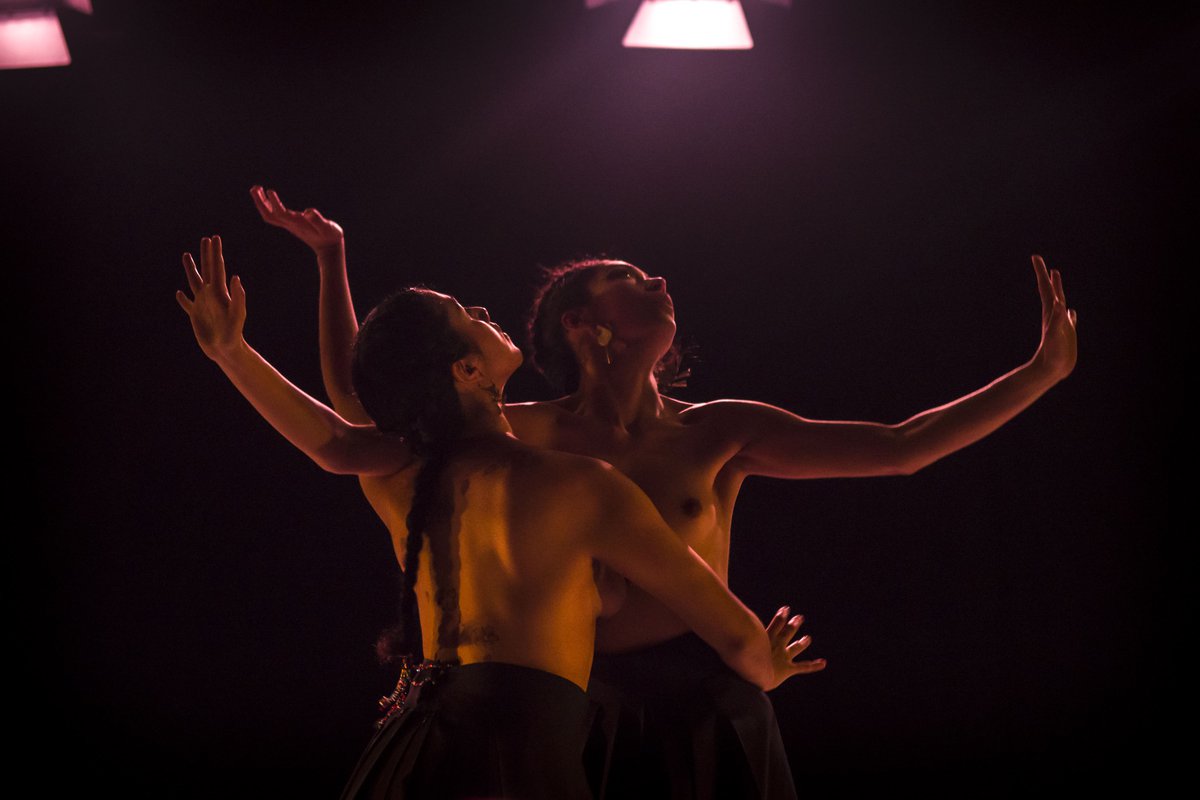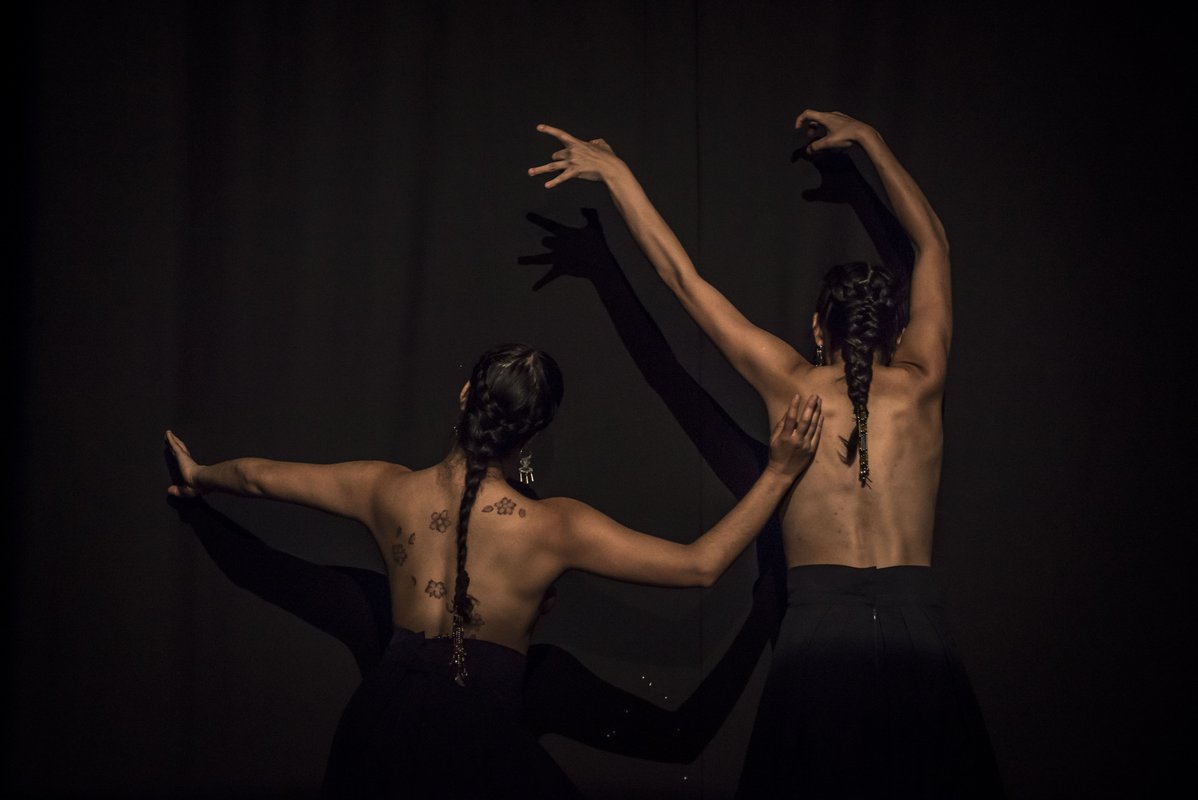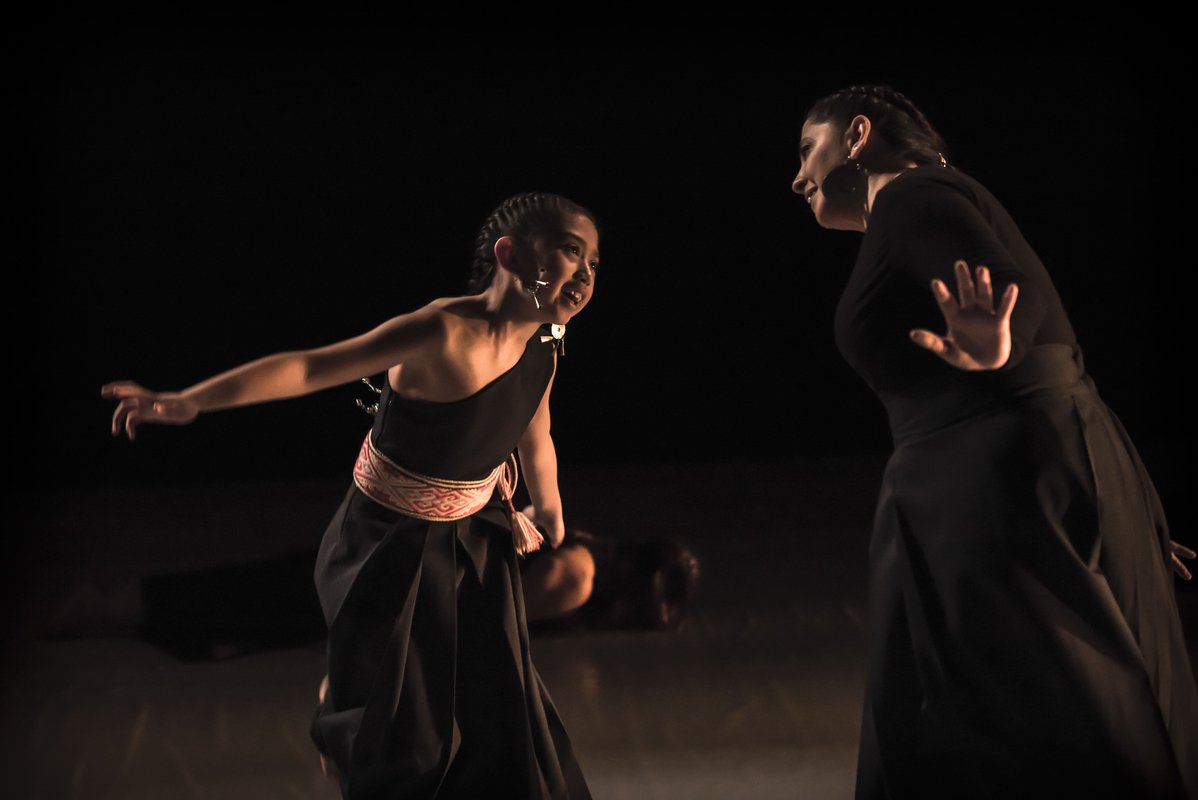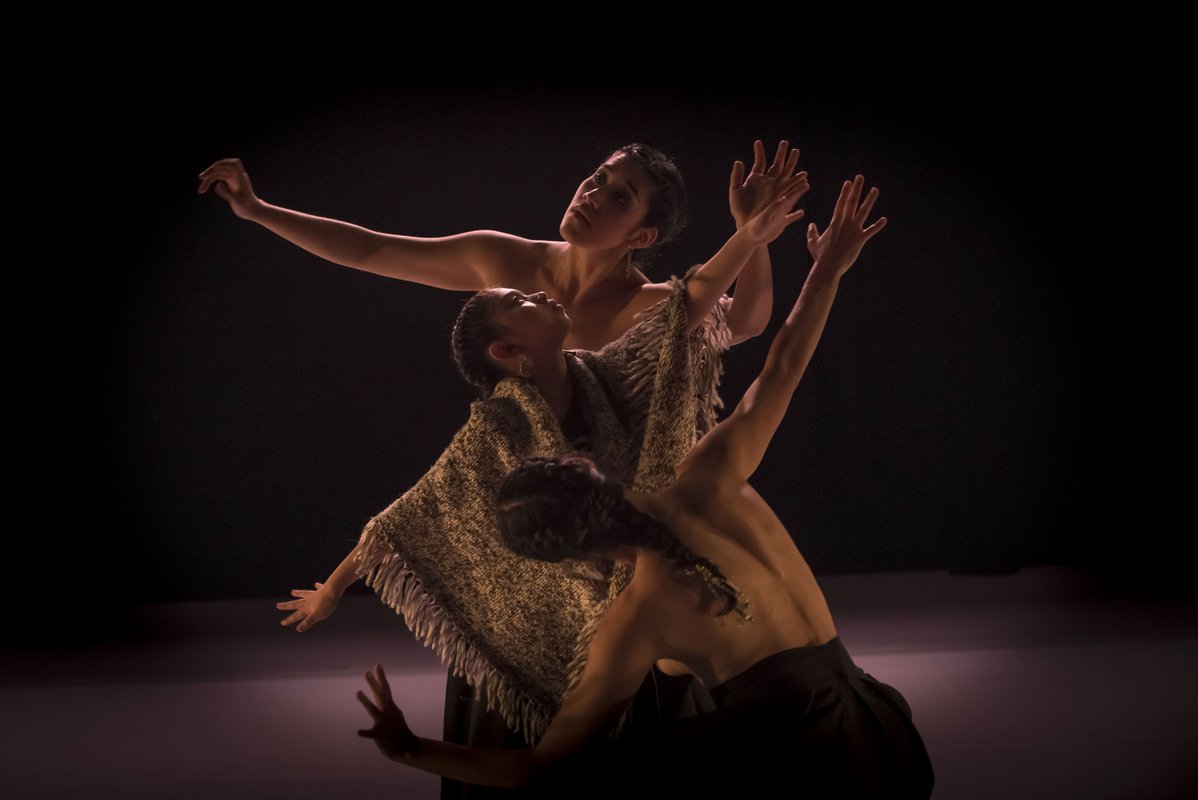Dance
January 22nd, Santiago
Director: Ricardo Curaqueo Curiche | Assistant director and creator: Karen Carreño Rivera | Art director: Deysi Cruz Vásquez | Lighting designer: Francisco Herrera | Sound designer: Joaquín Montecinos Ortiz | Performers: Ayelen Curaqueo Curiche, Florencia Neira Oros, Agata Espinoza Fontana, María Paz Silva Romero, Rallen Montenegro Aguilera, Nathalie Moris Caniulef, Danitza Segura Licanqueo, Catalina Fernández Amado, Constanza Díaz Alfaro, Karina Díaz Osorio, Yasmín Millán Castro, Sonia Orobia Retamales, Millaray Ruiz Conejeros, Loreto Millalén Iturriaga, Norma Hueche Nahuel, Elsa Quinchaleo.
Ricardo Curaqueo
Choreographer
We’ll dance a thousand times over
This dance performer, teacher and choreographer graduated from the Modern School of Music and Dance and also studied the theory and history of art at the University of Chile. As an artist and Mapuche devotee, he’s carried out important work to revive and highlight the importance of his people/nation’s art and culture. He’s directed plays like Kalfü Kütral (2016), Malen (2017), Aliwen (2019) and Weichafe (2019). Malen has been performed in Chile, Peru, Spain and Colombia and will soon be premiered in Belgium and Germany. He also won an award from the Art Critics Circle in Chile for Best National Dance in 2017, as well as the Clap award for Best Contemporary Dance Performance in 2018. He’s currently preparing a new piece called Üñümche: El retorno de los hombres pájaro (financed by a 2020 national FONDART grant).
“An act of revindication, a revival of the Mapuche world view and a take on Mapuche spirituality”.
––Hiedra Magazine
“Rites, earth, femininity, native forests. That’s what Malen refers to, among other things”.
“(A) contemporary dance piece whose aim is to move the Mapuche people from a place of marginalization and bring their beliefs to the stage”.
“Malen isn’t just a production that showcases Mapuche traditions with pride. It’s also a way for Curaqueo and the team to try and decolonize the body”.
––El Comercio, Peru
––With Malen, Ricardo Curaqueo established himself as one of Chile’s most outstanding and promising choreographers and dancers, something that was confirmed after he received the award for best Chilean dance production from the Chilean Circle of Art Critics in 2017. As a dancer, he has also worked under important Chilean and foreign choreographers, including Lemi Ponifasio (Mau mapuche) and Pablo Rotemberg (La noche obstinada).
––Malen is an exploration of what it means to be a Mapuche and thinking, feeling and moving like one in the present. To do this, Curaqueo chose to fuse the pürrún (a Mapuche dance) with something contemporary, one of the things most commented on by the press. “This is one of the qualities of Curaqueo and his team: working on what it is to be Mapuche from the perspective of young artists”, wrote Marietta Santi in the La Hora newspaper.
––This piece aims to present a different image of the Mapuche people and of its women in particular, leaving behind the stereotypes that are bandied around. The piece’s choreographer explains that “it’s a contemporary interpretation of a Mapuche world view that keeps its ritualistic nature. Both the costumes and the set are a reinterpretation of what is traditional, with an emphasis on the deep black of the costumes, on the silver metallic adornments and on the subtle iconography of Mapuche textiles”, he says, all of which were created by visual artist Deysi Cruz Vásquez.
––The contemporary part of this piece is in the fact that only women appear on stage. “The daring version of the choike dance originally only performed by men has a great impact, danced as it is in the show by two women with bare chests”, said one of the reviews published after its premiere. On the stage, each performer represents a certain age of the feminine Mapuche body, from infancy to adolescence, adulthood and finally old age.
The play’s origins. Ricardo Curaqueo’s younger sister, Ayelen, takes part in this piece. As opposed to her parents and brother, she has not been ‘Chileanized’ and, aged 10, she speaks the Mapuche language perfectly and lives as a Mapuche with complete ease. Peruvian newspaper El Comercio explains that “this is not common in children of her age and is what led her brother to create the dance show Malen based on her”. The choreographer adds that both he and his parents started going back to their roots when they began to feel a spiritual void. “We wanted to go back to what we are, so we started going to visit my 'papay' (grandmothers) to talk with them and find out more about them”.
Mapuche dance. As explained in Memoria Chilena, “dance (or pürrún) for the Mapuches is a ritual, something harmonious between humans and their surroundings that is connected to the mystery of faith. Basically, it’s one of the main testimonies of the nation’s world vision. That’s why the most important opportunities to dance occur at religious ceremonies”.
—Watch part of the touching ceremony in memory of Camilo Catrillanca held by the cast of Malen in October 2018 at the GAM Center.
Malen
By Ricardo Curaqueo
- Chile
- 60 minutes, without an intermission
- + 9 años
A meeting of Mapuche women of different ages, with the aim of giving new significance to this nation today.
In the Mapuche language, the word malen refers to young girls who start learning ancestral knowledge from older women. It’s this inter-generational dialogue that choreographer and dancer Ricardo Curaqueo brings to the stage using contemporary dance and 16 female performers aged between 9 and 70. The legacy of feminine Mapuche poetics comes to Santiago a Mil in a meeting of women of different ages, with the aim of giving new significance to this nation today. This piece of contemporary dance is both a reconstruction of and an attempt to restore Mapuche life and culture, proposing women and children as the main instigators of action and creation. Malen is an invitation to think about the reality of Mapuches today, getting rid of the prejudice towards them, improving how accessible they are and closing the gap with them using the body. In other words, watching Malen is to think about Mapuche dance. This piece won an award for best Chilean dance piece from the Chilean Circle of Art Critics in 2017.
Malen
By Ricardo Curaqueo
- Chile
- 60 minutes, without an intermission
- + 9 años
A meeting of Mapuche women of different ages, with the aim of giving new significance to this nation today.
In the Mapuche language, the word malen refers to young girls who start learning ancestral knowledge from older women. It’s this inter-generational dialogue that choreographer and dancer Ricardo Curaqueo brings to the stage using contemporary dance and 16 female performers aged between 9 and 70. The legacy of feminine Mapuche poetics comes to Santiago a Mil in a meeting of women of different ages, with the aim of giving new significance to this nation today. This piece of contemporary dance is both a reconstruction of and an attempt to restore Mapuche life and culture, proposing women and children as the main instigators of action and creation. Malen is an invitation to think about the reality of Mapuches today, getting rid of the prejudice towards them, improving how accessible they are and closing the gap with them using the body. In other words, watching Malen is to think about Mapuche dance. This piece won an award for best Chilean dance piece from the Chilean Circle of Art Critics in 2017.
Director: Ricardo Curaqueo Curiche | Assistant director and creator: Karen Carreño Rivera | Art director: Deysi Cruz Vásquez | Lighting designer: Francisco Herrera | Sound designer: Joaquín Montecinos Ortiz | Performers: Ayelen Curaqueo Curiche, Florencia Neira Oros, Agata Espinoza Fontana, María Paz Silva Romero, Rallen Montenegro Aguilera, Nathalie Moris Caniulef, Danitza Segura Licanqueo, Catalina Fernández Amado, Constanza Díaz Alfaro, Karina Díaz Osorio, Yasmín Millán Castro, Sonia Orobia Retamales, Millaray Ruiz Conejeros, Loreto Millalén Iturriaga, Norma Hueche Nahuel, Elsa Quinchaleo.
Ricardo Curaqueo
Choreographer
We’ll dance a thousand times over
This dance performer, teacher and choreographer graduated from the Modern School of Music and Dance and also studied the theory and history of art at the University of Chile. As an artist and Mapuche devotee, he’s carried out important work to revive and highlight the importance of his people/nation’s art and culture. He’s directed plays like Kalfü Kütral (2016), Malen (2017), Aliwen (2019) and Weichafe (2019). Malen has been performed in Chile, Peru, Spain and Colombia and will soon be premiered in Belgium and Germany. He also won an award from the Art Critics Circle in Chile for Best National Dance in 2017, as well as the Clap award for Best Contemporary Dance Performance in 2018. He’s currently preparing a new piece called Üñümche: El retorno de los hombres pájaro (financed by a 2020 national FONDART grant).
“An act of revindication, a revival of the Mapuche world view and a take on Mapuche spirituality”.
––Hiedra Magazine
“Rites, earth, femininity, native forests. That’s what Malen refers to, among other things”.
“(A) contemporary dance piece whose aim is to move the Mapuche people from a place of marginalization and bring their beliefs to the stage”.
“Malen isn’t just a production that showcases Mapuche traditions with pride. It’s also a way for Curaqueo and the team to try and decolonize the body”.
––El Comercio, Peru
––With Malen, Ricardo Curaqueo established himself as one of Chile’s most outstanding and promising choreographers and dancers, something that was confirmed after he received the award for best Chilean dance production from the Chilean Circle of Art Critics in 2017. As a dancer, he has also worked under important Chilean and foreign choreographers, including Lemi Ponifasio (Mau mapuche) and Pablo Rotemberg (La noche obstinada).
––Malen is an exploration of what it means to be a Mapuche and thinking, feeling and moving like one in the present. To do this, Curaqueo chose to fuse the pürrún (a Mapuche dance) with something contemporary, one of the things most commented on by the press. “This is one of the qualities of Curaqueo and his team: working on what it is to be Mapuche from the perspective of young artists”, wrote Marietta Santi in the La Hora newspaper.
––This piece aims to present a different image of the Mapuche people and of its women in particular, leaving behind the stereotypes that are bandied around. The piece’s choreographer explains that “it’s a contemporary interpretation of a Mapuche world view that keeps its ritualistic nature. Both the costumes and the set are a reinterpretation of what is traditional, with an emphasis on the deep black of the costumes, on the silver metallic adornments and on the subtle iconography of Mapuche textiles”, he says, all of which were created by visual artist Deysi Cruz Vásquez.
––The contemporary part of this piece is in the fact that only women appear on stage. “The daring version of the choike dance originally only performed by men has a great impact, danced as it is in the show by two women with bare chests”, said one of the reviews published after its premiere. On the stage, each performer represents a certain age of the feminine Mapuche body, from infancy to adolescence, adulthood and finally old age.
The play’s origins. Ricardo Curaqueo’s younger sister, Ayelen, takes part in this piece. As opposed to her parents and brother, she has not been ‘Chileanized’ and, aged 10, she speaks the Mapuche language perfectly and lives as a Mapuche with complete ease. Peruvian newspaper El Comercio explains that “this is not common in children of her age and is what led her brother to create the dance show Malen based on her”. The choreographer adds that both he and his parents started going back to their roots when they began to feel a spiritual void. “We wanted to go back to what we are, so we started going to visit my 'papay' (grandmothers) to talk with them and find out more about them”.
Mapuche dance. As explained in Memoria Chilena, “dance (or pürrún) for the Mapuches is a ritual, something harmonious between humans and their surroundings that is connected to the mystery of faith. Basically, it’s one of the main testimonies of the nation’s world vision. That’s why the most important opportunities to dance occur at religious ceremonies”.
—Watch part of the touching ceremony in memory of Camilo Catrillanca held by the cast of Malen in October 2018 at the GAM Center.





